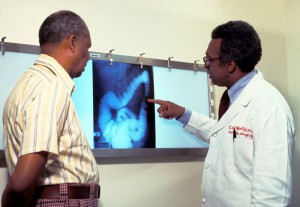Signs and symptoms of colon cancer include:
- A change in your bowel habits, including diarrhea or constipation or a change in the consistency of your stool
- Rectal bleeding or blood in your stool
- Persistent abdominal discomfort, such as cramps, gas or pain
- A feeling that your bowel doesn’t empty completely
- Weakness or fatigue
- Unexplained weight loss
Many people with colon cancer experience no symptoms in the early stages of the disease. When symptoms appear, they’ll likely vary, depending on the cancer’s size and location in your large intestine.
- Older age. The great majority of people diagnosed with colon cancer are older than 50. Colon cancer can occur in younger people, but it occurs much less frequently.
- African-American race. African-Americans have a greater risk of colon cancer than do people of other races.
- A personal history of colorectal cancer or polyps. If you’ve already had colon cancer or adenomatous polyps, you have a greater risk of colon cancer in the future.
- Inflammatory intestinal conditions. Chronic inflammatory diseases of the colon, such as ulcerative colitis and Crohn’s disease, can increase your risk of colon cancer.
- Inherited syndromes that increase colon cancer risk. Genetic syndromes passed through generations of your family can increase your risk of colon cancer.
- Low-fiber, high-fat diet. Colon cancer and rectal cancer may be associated with a diet low in fiber and high in fat and calories.
- A sedentary lifestyle. If you’re inactive, you’re more likely to develop colon cancer. Getting regular physical activity may reduce your risk of colon cancer.
- Diabetes. People with diabetes and insulin resistance may have an increased risk of colon cancer.
- Obesity. People who are obese have an increased risk of colon cancer and an increased risk of dying of colon cancer when compared with people considered normal weight.
- Smoking. People who smoke cigarettes may have an increased risk of colon cancer.
- Alcohol. Heavy use of alcohol may increase your risk of colon cancer.
How is for Colon Cancer diagnosed?
- Colonoscopy: An endoscope is inserted into the rectum and advanced through the colon, through this the doctor can
examine the entire colon.
- Diagnosis is confirmed with a colon biopsy – Stage of disease is confirmed by pathologists and imaging tests, such as computerized tomography (CT or CAT) scans.
- Endoscopic ultrasound and magnetic resonance imaging (MRI) may also be used to stage rectal cancer
- Sigmoidoscopy: In this an endoscope is interested in the rectum and moved through the left side of the colon. It cannot be used to view the middle and right sides of the colon.
- Fecal occult blood test (FOBT) along with Complete blood count (CBC) to check for anemia and CT , MRI or PET scans of the abdomen, pelvic area
Treatment Options available for Colon Cancer at Top Cancer Hospitals in India
| Minimal Invasive Laparoscopic Colon Cancer Surgery |
- The surgeon enters the abdomen by placing a canula (a narrow tube like instrument) into the abdomen (belly) through a small incision (½ — ¼ inch)
- Carbon Dioxide gas is pumped into the abdomen through the port (cannula) to puff-up or inflate the belly, making working room for the surgeon.
- A laparoscope (a tiny telescope connected to a video camera) is placed through the canula, and allows the surgeon to see a magnified lighted view of the internal organs on a TV monitor
- 2 to 4 other canulas are inserted to allow use of special instruments to work inside the abdominal cavity (belly).
- If a portion of the colon is removed, one of the small canula incisions is slightly enlarged to permit removal of the tissue.
Advantages of Minimal Invasive Laparoscopic Colon Cancer Surgery
- Minimally invasive, Less surgical trauma, shorter hospitalization, Improved cosmetic results
- Reduced post operative pain, faster recovery and return to daily activities and normal diet.
- Less postoperative pain killer requirement
To know more about Colon Cancer Treatment in India, please visit this link : https://safemedtrip.com/medical-services/cancer-treatment-in-india/colon-cancer-treatment-in-india.html

 Click to WhatsApp
Click to WhatsApp +91-9899993637
+91-9899993637






